Related Research Articles
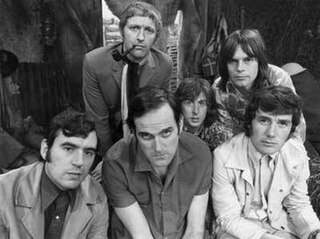
Monty Python were a British comedy troupe formed in 1969 consisting of Graham Chapman, John Cleese, Terry Gilliam, Eric Idle, Terry Jones, and Michael Palin. The group came to prominence for the sketch comedy series Monty Python's Flying Circus, which aired on the BBC from 1969 to 1974. Their work then developed into a larger collection that included live shows, films, albums, books, and musicals; their influence on comedy has been compared to the Beatles' influence on music. Their sketch show has been called "an important moment in the evolution of television comedy".
"Crunchy Frog" is the common name for a Monty Python sketch officially titled "Trade Description Act", inspired by the Trade Descriptions Act 1968 in British law. It features two health inspectors interrogating the owner of a sweet shop about the increasingly bizarre ingredients in his confections, including the titular crunchy frog. Written by John Cleese and Graham Chapman, it originally appeared in episode 6 of the first series of Monty Python's Flying Circus, and later appeared in several Monty Python stage shows. In the original sketch, Cleese and Chapman play the inspectors, while Terry Jones plays the sweet shop owner. In later versions, the second inspector is played by Terry Gilliam or left out of the sketch entirely.

"The Lumberjack Song" is a comedy song by the comedy troupe Monty Python. The song was written and composed by Terry Jones, Michael Palin, and Fred Tomlinson.
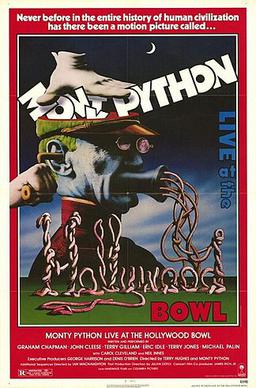
Monty Python Live at the Hollywood Bowl is a 1982 concert comedy film directed by Terry Hughes and starring the Monty Python comedy troupe as they perform many of their sketches at the Hollywood Bowl. The film also features Carol Cleveland in numerous supporting roles and Neil Innes performing songs. Also present for the shows and participating as an 'extra' was Python superfan Kim "Howard" Johnson.

And Now for Something Completely Different is a 1971 British sketch comedy film based on the television comedy series Monty Python's Flying Circus featuring sketches from the show's first two series. The title was taken from a catchphrase used in the television show.

The Bruces sketch is a comedy sketch that originally appeared in a 1970 episode of the television show Monty Python's Flying Circus, episode 22, "How to Recognise Different Parts of the Body", and was subsequently performed on audio recordings and live on many occasions by the Monty Python team.
The Dirty Fork, also known simply as Restaurant Sketch, is a Monty Python sketch that appeared in episode 3 of the first series of the television series Monty Python's Flying Circus, and later in the film, And Now For Something Completely Different. It is notable for being the first Monty Python sketch wherein the characters react to the audience "booing" them.
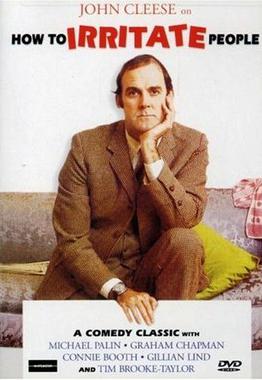
How to Irritate People is a US sketch comedy television broadcast recorded in the UK at LWT on 14 November 1968 and written by John Cleese, Graham Chapman, Marty Feldman and Tim Brooke-Taylor. Cleese, Chapman, and Brooke-Taylor also feature in it, along with future Monty Python collaborators Michael Palin and Connie Booth.

Monty Python's Fliegender Zirkus is a pair of 45-minute Monty Python German television comedy specials produced by WDR for West German television. The two episodes were respectively first broadcast in January and December 1972 and were shot entirely on film and mostly on location in Bavaria, with the first episode recorded in German and the second recorded in English and then dubbed into German.
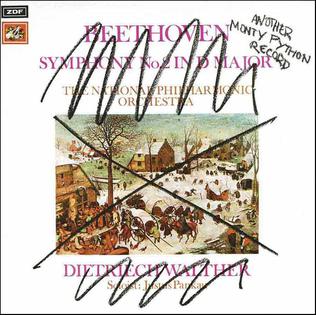
Another Monty Python Record is the second album produced by the Monty Python comedy group, released in 1971. Dissatisfied with their monaural BBC debut album released the previous year, the group took full control of the follow-up, which would be the first release of a six-album deal with Charisma Records in the UK. Most of the material is from the second BBC series of Monty Python's Flying Circus, with a few newly written pieces. One track, "Stake Your Claim", is an English-language version of a sketch from the team's first German episode.
"Election Night Special" is a Monty Python sketch parodying the coverage of United Kingdom general elections, specifically the 1970 general election, on the BBC by including hectic actions by the media and a range of ridiculous candidates.
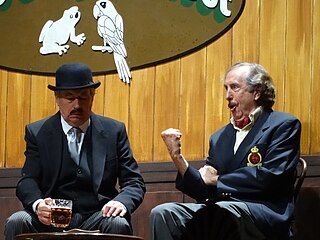
"Candid Photography", better known as "Nudge Nudge", is a sketch from the third Monty Python's Flying Circus episode, "How to Recognise Different Types of Trees From Quite a Long Way Away" featuring Eric Idle and Terry Jones as two strangers who meet in a pub.

"Argument Clinic" is a sketch from Monty Python's Flying Circus, written by John Cleese and Graham Chapman. The sketch was originally broadcast as part of the television series and has subsequently been performed live by the group. It relies heavily on wordplay and dialogue, and has been used as an example of how language works.
The Undertakers sketch is a comedy sketch from the 26th episode of Monty Python's Flying Circus, entitled "Royal Episode 13". It was the final sketch of the thirteenth and final episode of the second season, and was perhaps the most notorious of the Python team's television sketches.
"Dirty Hungarian Phrasebook" is a Monty Python sketch. It first aired in 1970 on Monty Python's Flying Circus as part of Episode 25, and also appears in the film And Now for Something Completely Different. Atlas Obscura has noted that it may have been inspired by English as She Is Spoke, a 19th-century Portuguese–English phrase book regarded as a classic source of unintentional humour, as the given English translations are generally completely incoherent.
The "Architects Sketch" is a Monty Python sketch, first seen in episode 17 of Monty Python's Flying Circus, "The Buzz Aldrin Show". The episode was recorded on 18 September 1970 and originally broadcast on 20 October 1970. The following year, an audio version was recorded for Another Monty Python Record.
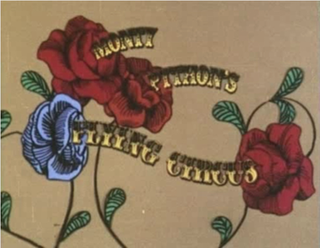
Monty Python's Flying Circus is a British surreal sketch comedy series created by and starring Graham Chapman, John Cleese, Eric Idle, Terry Jones, Michael Palin, and Terry Gilliam, who became known collectively as "Monty Python", or the "Pythons". The first episode was recorded at the BBC on 7 September 1969 and premiered on 5 October on BBC1, with 45 episodes airing over four series from 1969 to 1974, plus two episodes for German TV. A feature film adaptation of several sketches, And Now for Something Completely Different, was released in 1971.
"Albatross" is a sketch from Monty Python's Flying Circus. It is particularly known for its opening lines: "Albatross! Albatross! Albatross!"
References
- 1 2 3 Script for 'Lifeboat (Cannibalism)', archived from the original on 8 September 2009, retrieved 1 December 2009
- ↑ Chester, Simon (14 May 2012). "The case that keeps on giving". Slaw. British Columbia, Canada: Stem Legal. Retrieved 23 October 2018.
- ↑ 14 Q.B.D. 273
- ↑ Just the Words - Monty Python's Flying Circus - Episode 26 - Lifeboat (cannibalism)